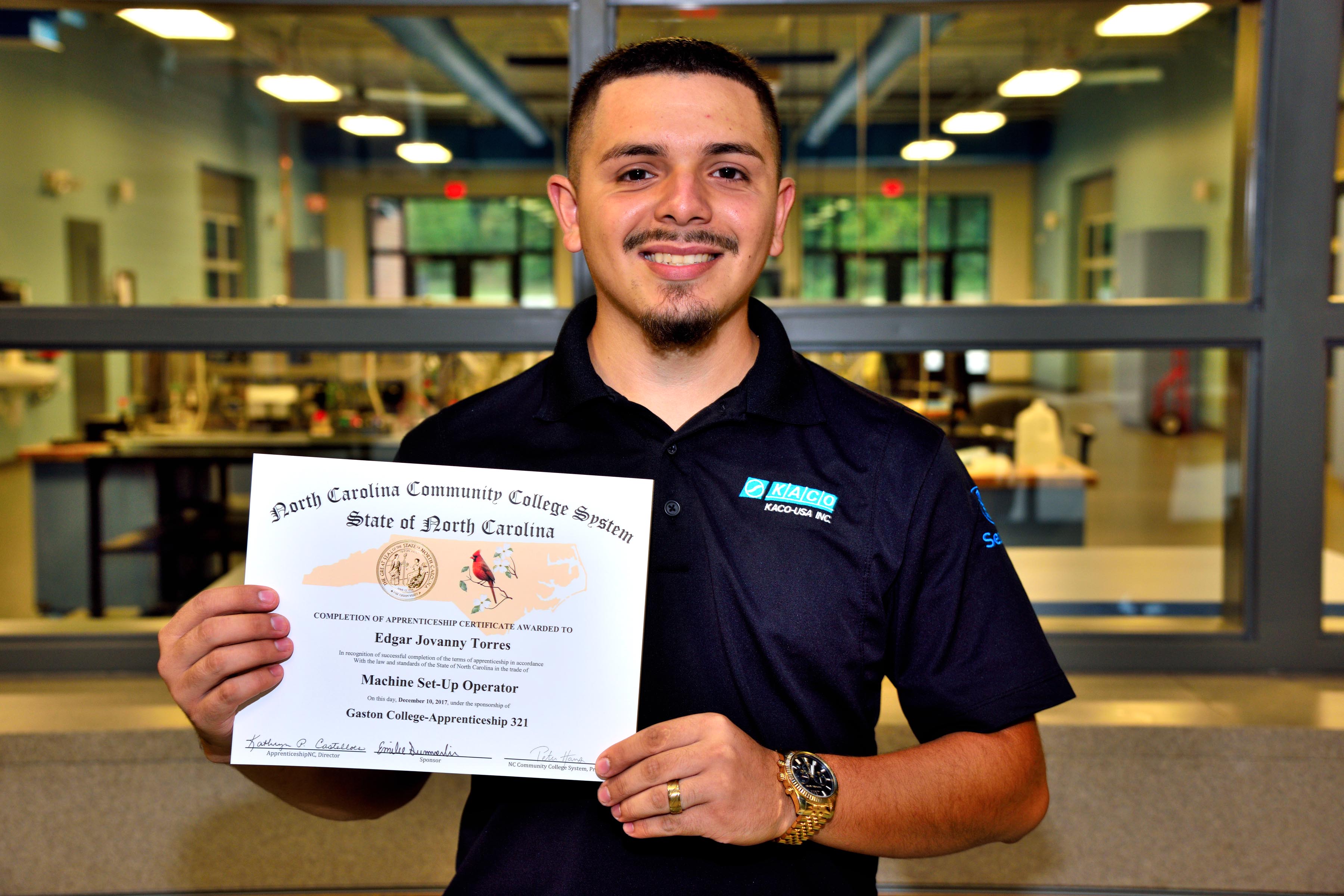
By LaShawn L. Hudson
Edgar Torres says when he looks back, he was probably always destined for a career in advanced manufacturing.
“When I was growing up, I used to help my dad fix things,” explains Torres, now 22. “I would always follow him around. I remember him allowing me to help him fix things around the house.”
His fondest memories working alongside his father as a handyman finally evolved into a real career opportunity about three years ago. At the time, he was working full-time as a machine operator at KACO USA Incorporated in Lincolnton, about 35 miles northwest of Charlotte.
After a few months on the job, Torres says his employer presented him with the opportunity of a lifetime: Join a new program that would allow him to work full-time while earning college credit for free.
“The apprenticeship opened me up to new possibilities. It allowed me to do something that at first I didn’t think I would like, honestly,” he admits.
His employer is one of 10 local manufacturers partnering with Gaston College for the Apprenticeship 321 program, launched in 2015. Jill Hendrix and Tanya Osbia oversee the apprenticeship program. Both say it was designed to produce and recruit the next generation of skilled workers in advanced manufacturing.
“This program gives opportunity,” says Hendrix, who serves as the coordinator. “Our apprentices have the opportunity to retire as a machinist, maintenance technician or as an electrician, if that’s the career path they want to take. Our apprentices also have the opportunity to go into management.”
Although each participating company selects each apprentice, apprentices each must pass a placement test, maintain at least 2.5 grade-point average and maintain strong attendance at work and at school. The length of each apprenticeship depends on the chosen occupational pathway and could last from two to four years.
Enrollees may choose one of five pathways: mechatronics technician, tool and die maker, machine set-up operator, chemical operator technicians or industrial maintenance mechanics.
“The five occupations that are within the apprenticeship program are occupations that companies have expressed a need for,” adds Osbia. “These are positions which they can’t seem to fill. There aren’t enough people working in advanced manufacturing.”
According to research published by the Deloitte Review in 2015, the demand for skilled workers will continue to surge as baby boomers retire. More than 3.5 million manufacturing jobs are expected to open up by 2025.
The Bureau of Labor Statistics also reports that manufacturing jobs were among the more than 250,000 jobs added to the U.S. economy in October of 2018.
Osbia says one of the biggest challenges she faces as a success coach is trying to change the stereotypical, outdated narrative about what it is like to work in advanced manufacturing.
“We are trying to get young people to understand that it’s not the same type of manufacturing that your grandparents did back in the day,” she says.
Currently, there are 19 apprentices enrolled in Apprenticeship 321. They hail from diverse backgrounds; at least three are women and at least two are Hispanic. Upon completion of the apprenticeship, each participant is awarded a nationally-recognized certification and an academic credential from Gaston College.
“The goal of Apprenticeship 321 is to graduate students so that they can complete their selected pathway and earn journeyworker’s card,” explains Hendrix. “It’s very much a triangle. We have the student at the heart of it and the success coach and the mentor at the base of the triangle, who support the student, helping them to successfully complete the program.”
As for Torres, after juggling work and school for nearly two years, in December of 2017, he completed the program and was promoted to a process technician’s job. He now fixes the same machines that he once operated. He is currently taking online classes and is working toward earning his associate degree in advanced manufacturing and engineering.
“My boss stuck his neck out to make sure I was successful.” he explains. ”It was the right moment and it was the right time. And I didn’t let the opportunity pass by; I took advantage of it.”
For more information about Apprenticeship 321, you may send an email to: apprenticeships@gaston.edu
